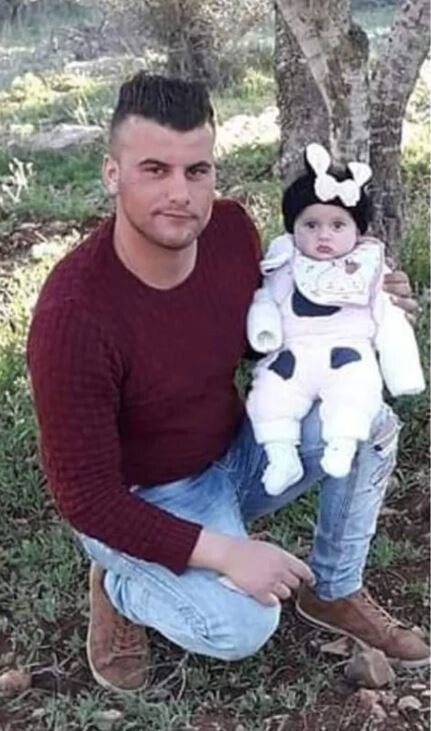Rights and Accountability 16 April 2019

Muhammad Abd al-Fattah with his daughter. (B’Tselem)
Israeli settlers executed a young Palestinian father earlier this month and soldiers destroyed video evidence of the incident, according to an investigation by the human rights group B’Tselem.
Yehoshua Sherman, one of the shooters, told media that Muhammad Abd al-Fattah, 23, was holding a knife and tried to open his car door and attack his teenage daughter.
B’Tselem’s investigation revealed a very different scenario, one in which Abd al-Fattah was killed not in self-defense, but as he lay on the ground, himself defenseless.
On the morning of 3 April, Abd al-Fattah was throwing stones at passing Israeli-plated vehicles from behind a dumpster across the road from the main square of Beita village, near the northern West Bank city of Nablus.
The young man threw stones towards two passing cars, and then a third stone, which hit a car, according to B’Tselem.
Sherman was the driver of the car that was hit by a stone. He pulled over and fired two shots from inside of his car before getting out.
“At that point, Abd al-Fattah was crouching among the dumpsters,” B’Tselem states. “Sherman approached him and fired several more shots at him.”
A truck driver pulled over and got out of his vehicle and, standing next to Sherman, “the two men fired several more shots at Abd al-Fattah, who was lying wounded on the ground.”
Minutes later, Israeli military forces arrived, using stun grenades to disperse a crowd that had gathered. Soon after, soldiers dismantled a digital video recorder, erasing the footage of the incident after watching it and recording the screen with their mobile phones.
Partial video footage of the incident was published by Israeli media.
A Palestinian bystander was hit in the stomach and was treated at a hospital for his injuries.
Israeli forces made no attempts to arrest the men who killed Abd al-Fattah and instead destroyed video footage “to ensure that the truth never comes to light and the shooters would not face any charges or be held accountable in any way,” B’Tselem states.
Settler impunity
Another recent incident illustrates the role the Israeli military plays in ensuring impunity for settlers who use violence against Palestinians.
On Saturday, dozens of masked Israelis from Yitzhar settlement threw stones at a Palestinian family, including children, in Urif village:
Soldiers who arrived to the scene fired tear gas and live ammunition at Palestinians who had gathered to confront the settlers, according to the human rights group Yesh Din.The military made no attempt to arrest the mob who had attacked the family.
The killing of Abd al-Fattah and the attack on the Palestinian family in Urif are just the latest examples of settler violence being met with no consequences. As B’Tselem states:
“Thousands of testimonies, videos and reports, as well as many years of close monitoring by B’Tselem and other organizations, reveal that Israeli security forces not only allow settlers to harm Palestinians and their property as a matter of course – they often provide the perpetrators escort and back-up.”
Forty-one Palestinians have died by Israeli fire so far this year.
On Friday, army sharpshooters hit 15-year-old Maysara Mousa Suleiman Abu Shalouf in the stomach with live fire as he approached the fence during Great March of Return protests along the Gaza-Israel boundary.
Nickolay Mladenov, the United Nations Middle East peace envoy, said that “Israel must calibrate its use of force, to not use lethal force, except as [a] last resort, under imminent death threat or serious injury.”Of the more than 200 Palestinians who have been killed since the Great March of Return protests began last year, 44 were children.
More than 8,200 Palestinians have been wounded by live fire during the protests, including some 1,500 children.
A UN commission of inquiry has found that Israel’s use of lethal force against protesters warrants criminal investigation and prosecution and may amount to war crimes and crimes against humanity.
Trump, Netanyahu welcome closure of Afghanistan probe
The situation in the occupied West Bank and Gaza Strip has been under preliminary examination by the International Criminal Court since 2015. Its chief prosecutor issued an unprecedented warning to Israeli leaders last year that they may face trial for the killings of unarmed protesters in Gaza.
On Friday, court judges rejected a request to investigate the Taliban, Afghan National Security Forces and US forces for alleged war crimes in Afghanistan partly because of the anticipated lack of state cooperation.
The announcement came days after the US revoked the International Criminal Court chief prosecutor’s visa.
Amnesty International stated that the decision is “a shocking abandonment of victims and will further weaken the court’s credibility.”US President Donald J. Trump welcomed the news, calling it “a major international victory, not only for these patriots, but for the rule of law.”
Trump warned that “Any attempt to target American, Israeli, or allied personnel for prosecution will be met with a swift and vigorous response.”
Benjamin Netanyahu, Israel’s prime minister, congratulated Trump for what he called “a correction of injustice” and “an act that has far-reaching influence with regard to the conduct of the international system in relation to the State of Israel.”





